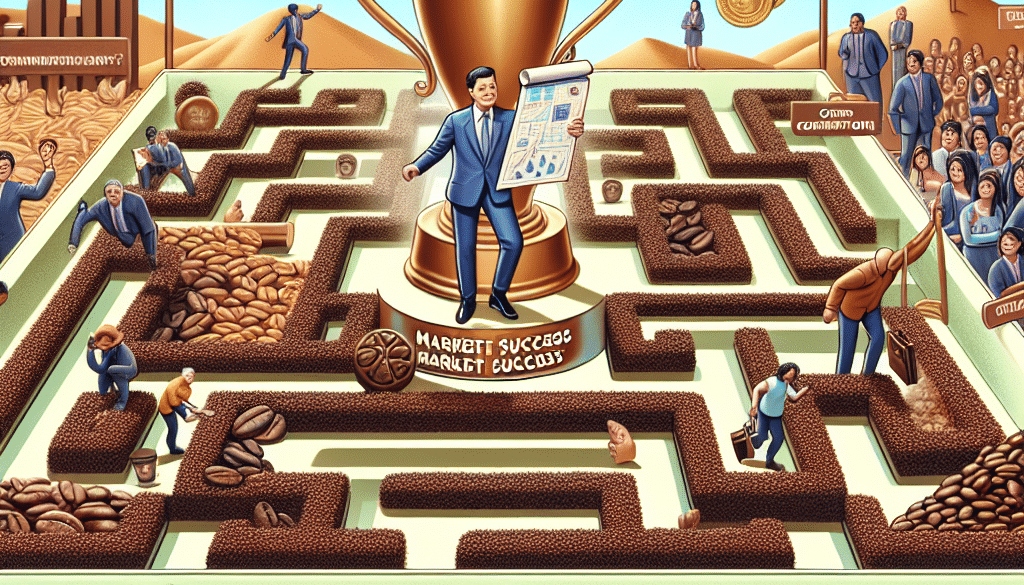Challenges of Marketing Coffee and Tea
-
Table of Contents
- Marketing Coffee and Tea: Navigating the Complexities and Challenges
- Understanding Consumer Preferences
- Competition in a Saturated Market
- Sustainability and Ethical Sourcing
- Adapting to Technological Advancements
- Health Trends and Product Innovation
- Regulatory Hurdles and Compliance
- Conclusion: Key Takeaways for Successful Marketing
- Enhance Your Beverage Offerings with ETprotein’s Quality Products
Marketing Coffee and Tea: Navigating the Complexities and Challenges

The global market for coffee and tea is vast and continues to grow, with millions of consumers indulging in these beverages daily. However, marketing these products comes with a unique set of challenges that companies must navigate to be successful. This article will explore the complexities of marketing coffee and tea, from consumer preferences to sustainability concerns, and provide insights into how businesses can effectively promote these beloved beverages.
Understanding Consumer Preferences
One of the primary challenges in marketing coffee and tea is understanding and catering to diverse consumer preferences. Coffee and tea drinkers have distinct tastes, which can vary significantly from one region to another. For instance, while some consumers prefer a strong, bold espresso, others may favor a light and aromatic green tea. Additionally, the rise of specialty beverages, such as cold brew coffee and matcha lattes, has further diversified the market.
- Demographic differences in beverage consumption
- Emerging trends in coffee and tea flavors
- The impact of cultural influences on beverage choice
Competition in a Saturated Market
The coffee and tea market is highly competitive, with numerous brands vying for consumer attention. From multinational corporations to local cafes, the competition is fierce, and standing out can be a significant challenge. Companies must differentiate their products through branding, quality, and unique selling propositions to capture market share.
- Strategies for differentiating products in a crowded marketplace
- Case studies of successful brand positioning
- Analysis of competitive dynamics in the coffee and tea industry
Sustainability and Ethical Sourcing
Consumers are increasingly concerned about the environmental impact and ethical implications of their purchases. Coffee and tea are no exception, with issues such as deforestation, water usage, and fair trade practices coming to the forefront. Companies must address these concerns by implementing sustainable and ethical sourcing methods, which can be both a challenge and an opportunity for marketing.
- The importance of certifications like Fair Trade and Rainforest Alliance
- Consumer attitudes towards sustainability in the coffee and tea industry
- Best practices for communicating ethical sourcing to customers
Adapting to Technological Advancements
Technology has transformed the way consumers purchase and enjoy coffee and tea. From online ordering to subscription services, companies must adapt their marketing strategies to keep up with technological advancements. Additionally, social media has become a crucial platform for engaging with customers and promoting products.
- The role of e-commerce in the coffee and tea market
- Utilizing social media for brand building and customer engagement
- Innovations in coffee and tea brewing technology
Health Trends and Product Innovation
Health consciousness is another factor influencing the coffee and tea market. Consumers are seeking products with health benefits, such as herbal teas or coffee with added vitamins. This shift requires companies to innovate and develop new products that cater to health-minded individuals.
- Emerging health trends in the coffee and tea industry
- Developing products with added health benefits
- Marketing strategies for health-focused beverages
Regulatory Hurdles and Compliance
Navigating the regulatory landscape is another challenge for coffee and tea marketers. Compliance with food safety standards, labeling requirements, and import/export regulations is essential for operating in the global market. Companies must stay informed and compliant to avoid costly penalties and protect their brand reputation.
- Understanding global food safety and labeling regulations
- Strategies for ensuring compliance in different markets
- The impact of trade agreements on the coffee and tea industry
Conclusion: Key Takeaways for Successful Marketing
In conclusion, marketing coffee and tea involves a complex interplay of understanding consumer preferences, differentiating products in a competitive market, addressing sustainability concerns, adapting to technological changes, innovating for health-conscious consumers, and ensuring regulatory compliance. Companies that can skillfully navigate these challenges are well-positioned to thrive in the dynamic and ever-evolving coffee and tea market.
Enhance Your Beverage Offerings with ETprotein’s Quality Products
If you’re looking to elevate your coffee and tea products with added health benefits, consider incorporating protein from ETprotein. Their high-quality organic bulk vegan proteins can be seamlessly integrated into beverages, providing a nutritional boost that aligns with current health trends. ETprotein’s offerings, including their L-(+)-Ergothioneine, are ideal for companies aiming to innovate and capture the health-conscious segment of the market.
About ETprotein:
ETprotein, a reputable protein and L-(+)-Ergothioneine (EGT) Chinese factory manufacturer and supplier, is renowned for producing, stocking, exporting, and delivering the highest quality organic bulk vegan proteins and L-(+)-Ergothioneine. They include Organic rice protein, clear rice protein, pea protein, clear pea protein, watermelon seed protein, pumpkin seed protein, sunflower seed protein, mung bean protein, peanut protein, and L-(+)-Ergothioneine EGT Pharmaceutical grade, L-(+)-Ergothioneine EGT food grade, L-(+)-Ergothioneine EGT cosmetic grade, L-(+)-Ergothioneine EGT reference grade and L-(+)-Ergothioneine EGT standard. Their offerings, characterized by a neutral taste, non-GMO, allergen-free attributes, with L-(+)-Ergothioneine purity over 98%, 99%, cater to a diverse range of industries. They serve nutraceutical, pharmaceutical, cosmeceutical, veterinary, as well as food and beverage finished product distributors, traders, and manufacturers across Europe, USA, Canada, Australia, Thailand, Japan, Korea, Brazil, and Chile, among others.
ETprotein specialization includes exporting and delivering tailor-made protein powder and finished nutritional supplements. Their extensive product range covers sectors like Food and Beverage, Sports Nutrition, Weight Management, Dietary Supplements, Health and Wellness Products, and Infant Formula, ensuring comprehensive solutions to meet all your protein needs.
As a trusted company by leading global food and beverage brands and Fortune 500 companies, ETprotein reinforces China’s reputation in the global arena. For more information or to sample their products, please contact them and email sales(at)ETprotein.com today.












